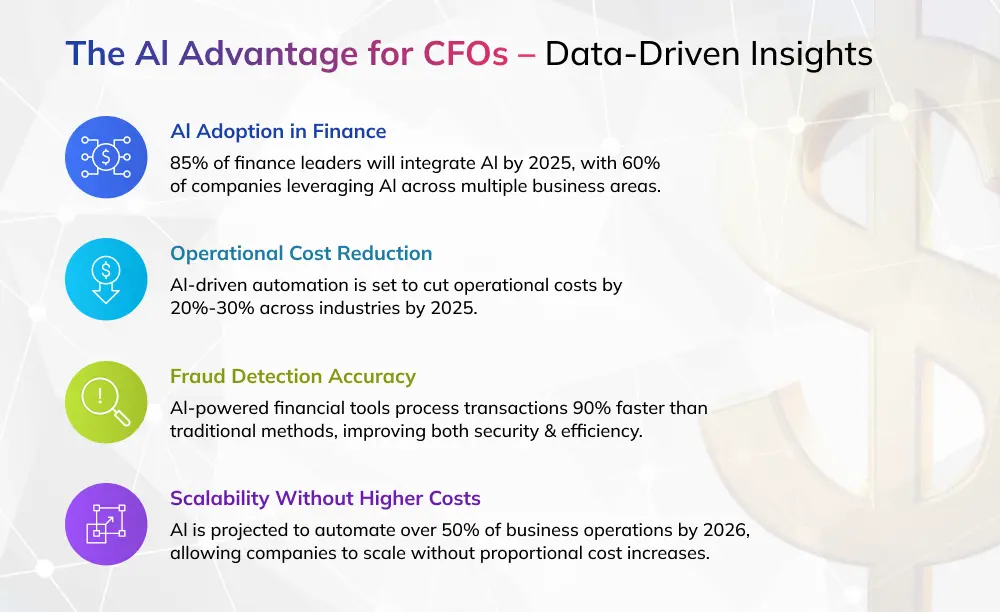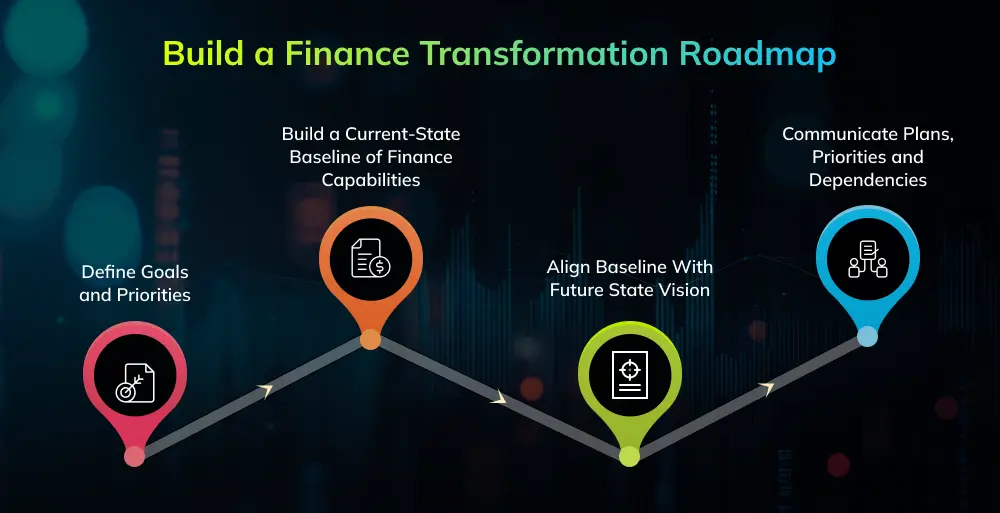
 Finance & Accounting
Finance & AccountingHow CFOs Are Using AI to Transform Financial Operations

Content
Over the last decade, the role of the CFO has undergone a major transformation. What was once a function centered on compliance, reporting, and cost control is now a strategic leadership role. It requires agility, insight, and a strong understanding of technology.
CFOs are expected to drive strategy, identify growth opportunities, and maintain organizational resilience. As demands grow, many rethink how they can structure their finance teams.
For example, CFOs are increasingly shifting from viewing outsourcing purely as a cost-saving measure to leveraging it for AI-driven transformation, unlocking strategic insights and supporting M&A alignment.
This article examines how CFOs utilize AI to transform financial operations, exploring its benefits, real-world applications, and key insights. This shift enables faster information processing and more accurate, data-driven decision-making for CFOs.
The Growing Importance of AI in Financial Operations
CFOs who adopt AI in their financial operations gain significant advantages from improved forecasting and reduced manual workloads to faster and more accurate insights. They’re not just keeping pace, but making smarter, data-driven decisions that move the business forward. To unlock these benefits, it’s essential to understand where AI can deliver the most impact.
BARC’s CFO Agenda 2025, which surveyed 187 finance executives, reveals that:
- 48% identified excessive manual effort and lack of automation as a major challenge, making automation through AI a top priority.
- 30% highlighted the need for a more strategic use of data analytics and AI, signaling a shift toward intelligent forecasting, scenario planning, and real-time decision support.
- 52% pointed to rising costs and resource demands, which AI can help address by boosting efficiency and reducing reliance on manual processes.
- 42% cited regulatory complexity and compliance as areas where AI-powered systems can improve accuracy, ensure consistency, and flag risks early.
These insights confirm that CFOs aren't just interested in AI for innovation they see it as essential for solving real operational pain points and enabling smarter, faster, and leaner finance functions.
7 Real World Applications of AI Enhancing CFO Performance
AI in financial operations is revolutionizing everything from lending decisions to fraud prevention. Here are seven practical ways CFOs are using AI right now.
You have to re-imagine how money can be managed and moved because there’s going to be more change in the next five years in financial services than happened in the past 30.”
– Dan Schulman, Former CEO of PayPal
1. Fraud Detection and Prevention
AI is transforming fraud detection by enabling real-time monitoring of transaction patterns to proactively identify and block suspicious activity. Financial institutions, such as Barclays, are leveraging AI to prevent fraudulent actions before they occur. Platforms like ThetaRay enhance transaction monitoring and AML screening, improving detection accuracy. These technologies enable banks to respond more quickly, enhance risk assessment, and comply with regulatory standards. The result is a more secure and resilient financial ecosystem.
CFOs stand to gain substantial benefits from AI-powered fraud detection tools. These systems enhance financial security, reduce fraud-related losses, and ensure compliance with evolving regulatory frameworks. By analyzing vast amounts of data, AI detects complex patterns and behaviors often missed by traditional methods. Supervised and unsupervised learning models allow these tools to adapt and improve continuously. This ongoing evolution enables more accurate risk profiling and better-informed financial decisions.
While implementation requires high-quality data and careful integration, AI offers unmatched scalability and precision. Major institutions, such as American Express and PayPal, have already reported measurable gains in fraud prevention. For CFOs, AI is not just a technological upgrade, it is a strategic necessity for strengthening asset protection, improving risk oversight, and reinforcing stakeholder trust in an increasingly data-driven financial landscape.
2. Smarter Credit Decisions
AI-driven credit scoring is reshaping the financial landscape by enabling CFOs to make faster, smarter, and more inclusive lending decisions. Traditional models, which rely heavily on static credit histories, are increasingly inadequate in assessing today’s dynamic borrower profiles.
AI models, such as those employed by platforms like Upstart, analyze a wide spectrum of real-time and non-traditional data, including transaction behavior, employment patterns, income potential, and behavioral signals, to generate more accurate and equitable credit evaluations. This data-centric approach reduces human bias, increases approval rates, and lowers default losses, empowering CFOs to optimize risk management while supporting financial inclusion.
For CFOs, AI delivers a transformative edge in managing credit portfolios with greater precision and purpose.
3. Risk Assessment and Management
CFOs can unlock measurable gains in risk and compliance by adopting AI-powered tools that elevate speed, precision, and foresight. AI enables finance teams to automate document reviews, monitor emerging risks in real time, and interpret complex regulatory frameworks with ease.
A prime example is JPMorgan Chase’s COiN platform, which uses machine learning to review commercial loan agreements a process that once consumed thousands of hours, now done in seconds with increased accuracy. This not only reduces financial risk from contractual oversights but also enhances confidence in decision-making.
To lead effectively, CFOs must integrate AI into daily workflows and treat it as a long-term capability, not just a tool.
4. Financial Advisory and Wealth Management
CFOs are increasingly turning to AI to transform wealth management by combining data intelligence with speed, precision, and personalization. AI-powered platforms like Mezzi and PortfolioPilot analyze market trends, financial goals, and risk profiles to generate real-time, tailored investment advice.
With retail investors expected to rely primarily on AI tools by 2027, CFOs are rethinking traditional wealth strategies to ensure their organizations stay ahead. The value lies not only in automation but also in augmenting human judgment with AI-enabled insights.
Ultimately, the future of wealth management lies in hybrid models, where AI drives efficiency and human expertise ensures trust and confidence. An expert AI partner like Invensis can help build and operationalize these intelligent, compliant systems.
5. Personalized Banking and 24/7 Support
CFOs are adopting AI-powered chatbots to transform finance functions, boost efficiency, and deliver consistent customer experiences. Tools like Bank of America’s Erica showcase how AI can process billions of interactions with precision, offering predictive insights and automating financial tasks. For CFOs, these assistants are no longer optional but essential in driving digital maturity across financial operations.
As AI becomes embedded across customer-facing finance systems, CFOs must shift focus toward scalability, data governance, and integration. Those who invest early in intelligent automation will not only improve service delivery but also unlock new opportunities for cost savings, revenue growth, and stronger financial resilience.
6. Financial document search and synthesis
Financial institutions often spend considerable time and resources locating, reading, and summarizing internal documents, time that could otherwise be spent on client engagement and strategic decision-making. This process becomes even more complex when dealing with unstructured data across disparate systems, such as PDF contracts, credit memos, underwriting documents, regulatory filings, and policy frameworks.
Generative AI is transforming how banks manage this information overload. By leveraging advanced natural language processing (NLP), Gen AI can rapidly search through vast repositories of documents, structured and unstructured alike, and extract relevant insights with speed and precision. For example, an analyst can simply prompt the system to “summarize the regulatory filings of Bank X for the last fiscal year” and receive a concise, accurate synthesis in seconds.
By reducing manual effort, AI enables financial professionals to spend less time hunting for information and more time applying insights ultimately improving client service, decision-making speed, and operational efficiency.
7. Capital Markets Research
Investment firms are tasked with processing vast amounts of complex data, including earnings call transcripts, company filings, macroeconomic reports, regulatory disclosures, and market forecasts—all delivered in varying formats and sources.
Generative AI is revolutionizing capital markets research by acting as a tireless research assistant for analysts. These AI systems can scan millions of documents, such as 10-Ks, 10-Qs, investor presentations, and consensus estimates, and extract the most relevant information in seconds. Instead of spending hours manually combing through documents, analysts can ask natural language queries like, “What were the key risk factors mentioned in Company Y’s last three earnings calls?” or “Summarize the latest market outlook for the semiconductor industry.”
So, why do CFOs combine AI with Outsourcing?
While AI holds promise, implementation isn’t always simple. That’s where outsourcing comes in. By partnering with Business Process Management (BPM) experts like Invensis, CFOs gain access to highly skilled finance professionals CPAs and compliance specialists who work seamlessly with AI tools and cloud platforms.
As companies expand globally, CFOs also manage distributed finance teams. Outsourcing supports this shift by enabling real-time collaboration, maintaining agility, and optimizing costs.
Tech-savvy leadership is essential, as CFOs must implement AI platforms that integrate in-house and offshore operations while ensuring compliance and ESG accountability. The result is a more efficient, forward-looking finance function.
AI delivers faster, more accurate outputs, identifies financial trends for better decision-making, reduces operational costs, and strengthens compliance. Supported by strategic outsourcing, today’s CFOs redefine finance as a powerful engine of innovation, resilience, and growth.
How Does Outsourcing Help CFOs Implement AI in Financial Operations?
Adopting AI in finance is a significant step, but it also comes with challenges. Many CFOs struggle with limited skills, high costs, and complex regulations. Outsourcing offers a smart way to overcome these barriers.
By working with experienced outsourcing partners, companies can access financial experts, AI tools, and efficient processes without needing to hire large in-house teams or invest in expensive systems.
Outsourcing doesn’t replace your finance team. Instead, it supports them by handling time-consuming tasks, so your internal team can focus on strategy and decision-making.
Finance Tasks CFOs Commonly Outsource
Key Challenges CFOs Face with AI Adoption in Finance
AI is transforming financial operations, but using it incorrectly can lead to costly mistakes. Many companies rush into AI without a clear plan, clean data, or the right tools, only to end up with poor results and wasted investments. Here are common challenges CFOs face when implementing AI-driven organizational transformation.
1. Empowering Teams Through AI Training
AI tools require users to have a good understanding of both technology and finance. CFOs must invest in comprehensive training programs to help their teams adopt AI, interpret outputs, and integrate new workflows. Without proper training, even the best AI solutions will not deliver value. That’s why experts like Edstellar rate AI as one of the most in-demand skills globally.
2. Navigating Regulatory and Ethical Landmines
Finance is heavily regulated, and AI systems must comply with data privacy laws and ethical standards. CFOs must ensure transparency in AI decision-making and guard against biases arising from flawed data or algorithms. Any failure to mitigate these risks can result in legal penalties to the company’s reputation.
3. Data Security
Security is paramount as AI relies on large volumes of sensitive financial data. CFOs must implement strong cybersecurity measures to prevent data breaches and unauthorized access. One security failure can result in huge financial loss and erosion of stakeholder trust.
4. Bridging the AI-Finance Talent Gap
According to corporate trends, there is a shortage of professionals with deep finance knowledge and scarce AI expertise. CFOs must compete with other industries to attract and retain this limited talent pool. Developing in-house capabilities through upskilling or partnering with outsourcing providers can help bridge the gap.
5. Balancing AI Investment with Business ROI
Deploying AI involves significant upfront investment in technology, infrastructure, and employee training. CFOs must manage these costs to balance short-term expenses with long-term benefits, ensuring that AI initiatives deliver measurable returns.

Bridging the Trust Gap in AI Adoption for Finance Operations
Perhaps the biggest barrier to AI success is trust, especially in highly regulated, high-stakes environments such as finance.
A recent survey by Kyriba reveals that 76% of CFOs believe AI poses significant security and privacy risks that could threaten their organization’s financial health. Despite this, 96% prioritize AI adoption, highlighting a clear tension between AI’s promise and concerns about trust, compliance, and readiness.
This "trust gap" the divide between AI's potential and the risks of misuse is a key barrier to enterprise-wide adoption. As AI becomes central to strategic growth, decision-making, and risk mitigation, CFOs must deploy it responsibly and effectively.
Partnering with trusted BPM providers like Invensis Technologies enables CFOs to navigate AI-driven finance transformation confidently. Invensis blends deep domain expertise with advanced AI capabilities to deliver accurate, efficient, and compliant finance operations. Its flexible outsourcing models empower CFOs to reduce operational costs, access specialized talent, and integrate AI-driven insights, freeing internal teams to focus on strategy and growth.
8 Ways Outsourcing Partners Help CFOs Succeed with AI
Outsourcing isn’t just about filling gaps it’s about enabling smarter, faster AI deployment. From setting objectives to tracking performance, here’s how trusted partners accelerate transformation.

1. Defining Clear Objectives
BPM and outsourcing partners collaborate with CFOs to pinpoint the areas with the highest impact on the finance function. They help pinpoint use cases such as improving forecasting accuracy or automating compliance tasks, ensuring AI investments target measurable business outcomes.
2. Building Cross-Functional Collaboration
Outsourcing AI requires a diverse mix of expertise across finance, IT, and data science. This cross-domain knowledge facilitates smooth collaboration between internal teams and external experts, accelerating AI deployment and integration.
3. Ensuring Data Quality and Governance Together
Trusted BPM providers help establish robust data governance frameworks. They manage data cleansing, validation, and privacy compliance, ensuring AI systems receive accurate and secure information for reliable insights.
4. Supporting Talent Development and Training
Outsourcing partners often provide ongoing training and support to finance teams, helping them build AI literacy. They may also supply specialized talent with AI and analytics skills, bridging gaps in internal capabilities.
5. Recommending Scalable, Flexible AI Technologies
BPM providers recommend and implement cloud-based AI solutions that can scale with the organization. Their technology choices prioritize seamless integration with existing finance systems, ensuring flexibility as business needs evolve.
6. Reducing Risk by Leveraging Trusted Outsourcing Expertise
Experienced partners offer proven methods and advanced tools that lower implementation risks and accelerate time-to-value.
7. Monitoring AI Performance with Partner Insights
Outsourcing teams continuously track AI performance against your objectives. Plus, they use insights to refine models, processes, and strategies, ensuring AI remains aligned with changing business needs.
8. Promoting a Collaborative Culture of Innovation
BPM providers foster an environment that encourages experimentation and the adoption of AI across finance functions.
Conclusion: The Future of Finance Is AI-Powered and Outsourced
As finance evolves, one thing is clear—AI and outsourcing are now core to the CFO’s playbook. While AI-powered automation and analytics enhance accuracy, efficiency, and decision-making, outsourcing provides access to specialized skills, scalability, and cost savings. Together, they enable CFOs to focus on high-value activities, such as strategic planning and risk management.
By defining clear goals, investing in talent, ensuring robust data governance, and partnering with trusted providers, CFOs can successfully navigate AI-driven transformations and meet evolving priorities.
Invensis Technologies is a trusted partner for CFOs ready to leverage AI-driven business process management. With deep industry expertise and advanced technology, Invensis helps optimize finance operations and drive sustainable growth.
Ready to take your finance function to the next level? Connect with Invensis today and unlock the full potential of AI and outsourcing.
FAQs
Discover Our Full Range of Services
Click HereExplore the Industries We Serve
Click HereBlog Category
Related Articles

Find the leading accounting firms in Singapore trusted by businesses for audit, tax, and advisory services.
November 6, 2025
|

Explore the leading accounting firms in South Africa providing expert audit, tax, cloud accounting, and payroll services. Learn about their key features and unique offerings.
November 6, 2025
|

Explore what project accounting is, how it works, and why it’s essential for businesses. Understand key principles, revenue recognition methods, and best practices to improve your knowledge.
October 7, 2025
|
Services We Provide
Industries We Serve





.webp)